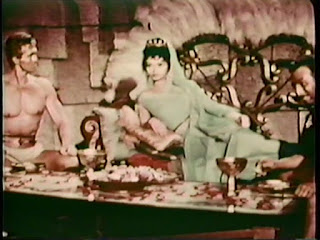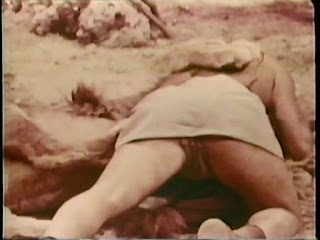For the first of these two films, we briefly leave the safe waters of Mill Creek to try our luck elsewhere. But -- since both of these movies involve a character who's saved from death by drowning -- perhaps we'll just dip our toes in and leave it at that. (After all, we've just eaten.)
Grade: B+
It's sobering to realize how randomly we stumble across -- and how easily we could have missed -- books that turn out to be pivotal (or at least deeply influential) in our lives. Sure, everyone inevitably encounters the likes of Harry Potter and Lord of the Rings sooner or later, while high school English classes have ensured that generations of students have at least a passing acquaintance with To Kill a Mockingbird or The Catcher in the Rye (not that those books meant terribly much to either of us).
But then we have The Butterfly Revolution. I (P.) have no memory of acquiring my copy, a coverless, dog-eared paperback that had already seen better days by the time my tween-age self got it (and which now seems to have vanished somewhere along the way). I'd never heard of the book, and for that matter I don't recall ever seeing a reference to it anywhere: it just stumbled into my life, more or less.
Maybe having no context for its tale of adolescent rebellion (nor any backcover blurbs to spoil the story) heightened the impact The Butterfly Revolution had on me. I've always had a weakness for stories about children and teenagers living autonomously, whether in the wilderness (My Side of the Mountain, The Runaway's Diary), as urban nomads (From the Mixed-up Files of Mrs. Basil E. Frankweiler) -- or, as here, simply by seizing the reins of power themselves.
Summer Camp Nightmare is, as you've no doubt figured out, an adaptation of The Butterfly Revolution for film: one assumes the original title struck the producers as a bit too "soft". That's one of several ways in which William Butler's 1961 book gets the requisite 1987 paint job, with another being the film's ample supply of big hair and gated reverb.
We also get new identities for several characters, including the novel's bookworm protagonist Winston "Winnie the Pooh" Weyn, who's now named Donald Poultry (Adam Carl). Uh, yeah.
The aforementioned 1980s aesthetics have earned Summer Camp Nightmare its share of mockery, especially online: if it has these things, it must be absurd, right? -- or, at least, so thinks the lazy reviewer looking for reasons to sneer.
But from where we sit, though Summer Camp Nightmare isn't a slavishly faithful adaptation of the book, it retains the most important parts of the plot, and the story has lost none of its punch.
Still, age changes everything, as well it should. Back then it was easy to identify with the kids, and their yearning for autonomy and freedom -- the freedom to choose, to make one's own disasters even if they were disasters; to owe nothing to no one, and live a life free of guilt and schedules. Maybe at heart, our basic sympathies still lie with them, but it's balanced out by other factors now.
One is a new appreciation for the tragic nature of the camp director, Mr. Warren, hardly the tyrant he might have once appeared to be. A fundamentally gentle man who genuinely wants to help and nurture the kids, he simply isn't equipped to understand the adolescents under his charge.
Chuck Connors -- his tall frame diminished by the years, but still imposing; his countenance mournful as ever -- is perfectly cast as Mr. Warren. Though stern at times and downright angry at others, mostly he seems just plain sad as he watches the long-held values of his youth swallowed up by punk rock, sass, and MTV-style sex. The hurt and betrayal etched on his face are hard to watch.
And speaking of sexuality, another unexpected revelation was how uncomfortable it felt to see the camp's young children exposed to the leering, transactional, monkey-see-monkey-do smuttiness of the adolescents. Easy to forget that when Dionysus is unleashed, someone still has to take care of the kids.
The biggest revelation of all, though, is Charlie Stratton as ringleader Frank Reilly. After we watched Summer Camp Nightmare we hit his page on IMDb, fully expecting to find a well-known actor with an extensive resume. It's downright shocking to see only 18 credits for someone so obviously charismatic, whose gaze is so unsettlingly intense...
...and weirdly familiar: we kept thinking we must know him from somewhere, but where? Someone in real life? Maybe there's a dash of Chinatown-era Roman Polanski in his dark-eyed intensity, but Stratton is better-looking and more charming.
Anyway, a movie like Summer Camp Nightmare stands or falls on the magnetism of its lead, and Stratton delivers. It's completely plausible that a group of kids would fall under the sway of a master manipulator like Reilly (it's never entirely clear whether he's a sociopath or a true believer), and while the film is hardly subtle in its cues, there's still a frisson of recognition in the way he smirks to himself when an opportunity arises to further his plans.
For us, at least, Summer Camp Nightmare wasn't camp. Of course the proceedings are gloriously 1980s, but so were the 1980s. For someone who was transfixed by The Butterfly Revolution as a kid, there's no issue of plausibility here -- no more than there is when Frodo goes to Mount Doom: it's as if these things really happened, and the only question is how well they're depicted.
While Summer Camp Nightmare isn't perfect in that regard, it's more than good enough to be a worthy adaptation of The Butterfly Revolution. It does change one subplot, but rightly so: its racial overtones, quite timely in 1961, would have been distracting and anachronistic 25 years later. Otherwise it loses none of the book's edge, adds elements of sexuality that serve to heighten the intensity of the narrative, and doesn't shy away from showing the human costs and tragic aspects of the revolution.
Grade: D
Now this, on the other hand, is a terrible and silly movie -- and yet there's something endearing about The Incredible Petrified World and its hapless attempts to craft a compelling yarn of undersea discovery. We've seen bad films that left us feeling insulted, embarrassed, or contemptuously amused, but none of those adjectives quite seem to apply here.
Perhaps it's because, despite its absurdities, there's something perversely rationalist about The Incredible Petrified World -- which, for a movie whose protagonists are all scientists, seems logical enough. From the beginning to the end, the film implicitly maintains that every problem can be overcome by the application of reason and hard work, with the occasional instructional film to spice things up.
Maybe that's it: though The Incredible Petrified World has a plot, characters, and lots of other things you'd wouldn't normally find in the Prelinger Archives, it somehow feels like an instructional film. That thread culminates in a 90-second, dialogue-free montage toward the end, showing several characters hard at work on an engineering problem, surrounded by machinery and accompanied by peppy period music (and fancy crossfades).
The only thing missing is a narrator -- and that was supplied when one of us looked at the other in the midst of all this and said "Science!", which pretty much sums it up.
The bulk of the film, though, is dedicated to the misadventures of a four-person, gender-balanced team that goes down a diving bell and ends up in a labyrinth of undersea (but air-filled) caves. That's another concept P. has always liked -- a massive cave system that exists autonomously, with its own flora, fauna, and environment wholly independent of the surface -- though the kind of depths conjured in Tolkien and D&D would rapidly prove impossible in real life, since deep caves are also blisteringly hot.
Anyway, the cave group gets the lion's share of screen time, but in terms of acting chops they're definitely the B-team -- though there's no shame in that when your co-star is John Carradine, whose screen presence is as classy as ever. Still, the two male leads are so bland as to be nearly indistinguishable, except that one guy looks a tiny bit like David Mitchell and the other one doesn't.
The worst part of The Incredible Petrified World is the contrived tension between the two women on the expedition, one of whom (Dale) has a horrific grudge against the other (Lauri) for no particularly discernible reason. This leads to dialogue like the following:
Dale: Friendly? Well, you just listen to me, Miss Innocent. There's nothing friendly between two females. There never was and there never will be.
Lauri: Sorry you feel that way. I was hoping we could...help one another.
Dale: Hmph. You don't need any help, and neither do I. Not as long as we have two men around us.
Yep, that's one for the ages.
Of course, we might better understand Dale's anger if we could read the break-up letter she received -- something the film makes a point of showing us, even ostentatiously so, yet leaves completely illegible in a way that seems more likely to be a cinematography issue than a typical bad Mill Creek print.
So, what else? Well, there's some diving:
There's a shark and an octopus, put in a tank together by some jerk so they'd fight à la Devil Monster:
There's a gnarly old man (with a wonderfully terrible fake beard) who lives in the caves --
-- and certainly doesn't intend to "Keep away from the ladies!"
There's a lizard, for no reason:
And there's one of the most pointless driving sequences we've seen this side of Manos --
-- which is itself bookended by an equally pointless air travel montage, whose inclusion suggests someone believed shots of landing gear would make people go "Gee whiz!" even at that late date. But hey, maybe it did?





















































